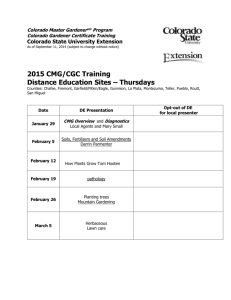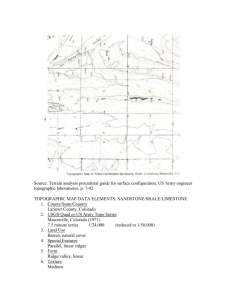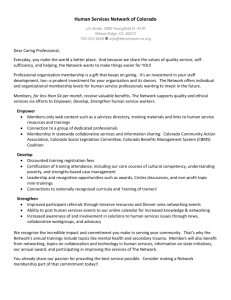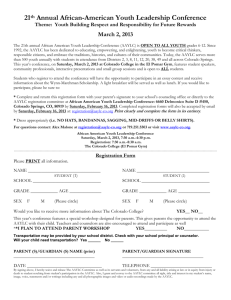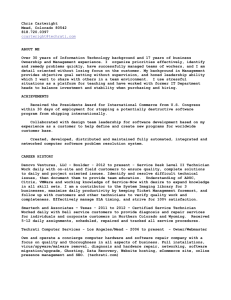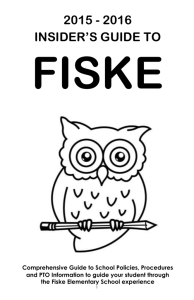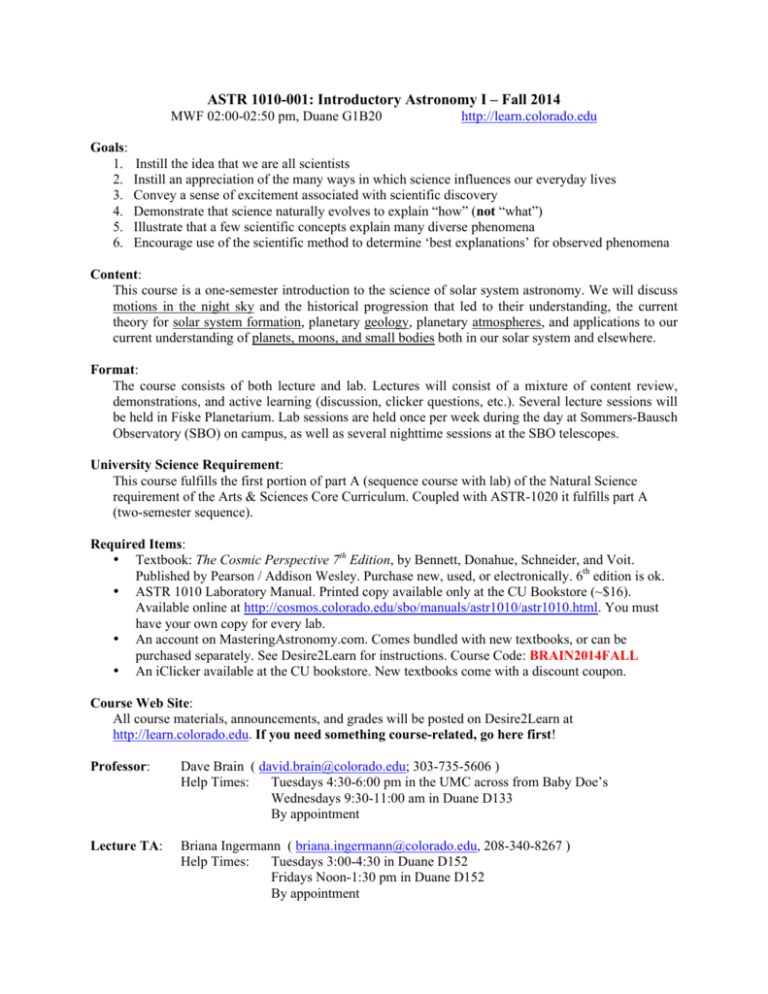
ASTR 1010-001: Introductory Astronomy I – Fall 2014
MWF 02:00-02:50 pm, Duane G1B20
Goals:
1.
2.
3.
4.
5.
6.
http://learn.colorado.edu
Instill the idea that we are all scientists
Instill an appreciation of the many ways in which science influences our everyday lives
Convey a sense of excitement associated with scientific discovery
Demonstrate that science naturally evolves to explain “how” (not “what”)
Illustrate that a few scientific concepts explain many diverse phenomena
Encourage use of the scientific method to determine ‘best explanations’ for observed phenomena
Content:
This course is a one-semester introduction to the science of solar system astronomy. We will discuss
motions in the night sky and the historical progression that led to their understanding, the current
theory for solar system formation, planetary geology, planetary atmospheres, and applications to our
current understanding of planets, moons, and small bodies both in our solar system and elsewhere.
Format:
The course consists of both lecture and lab. Lectures will consist of a mixture of content review,
demonstrations, and active learning (discussion, clicker questions, etc.). Several lecture sessions will
be held in Fiske Planetarium. Lab sessions are held once per week during the day at Sommers-Bausch
Observatory (SBO) on campus, as well as several nighttime sessions at the SBO telescopes.
University Science Requirement:
This course fulfills the first portion of part A (sequence course with lab) of the Natural Science
requirement of the Arts & Sciences Core Curriculum. Coupled with ASTR-1020 it fulfills part A
(two-semester sequence).
Required Items:
• Textbook: The Cosmic Perspective 7th Edition, by Bennett, Donahue, Schneider, and Voit.
Published by Pearson / Addison Wesley. Purchase new, used, or electronically. 6th edition is ok.
• ASTR 1010 Laboratory Manual. Printed copy available only at the CU Bookstore (~$16).
Available online at http://cosmos.colorado.edu/sbo/manuals/astr1010/astr1010.html. You must
have your own copy for every lab.
• An account on MasteringAstronomy.com. Comes bundled with new textbooks, or can be
purchased separately. See Desire2Learn for instructions. Course Code: BRAIN2014FALL
• An iClicker available at the CU bookstore. New textbooks come with a discount coupon.
Course Web Site:
All course materials, announcements, and grades will be posted on Desire2Learn at
http://learn.colorado.edu. If you need something course-related, go here first!
Professor:
Dave Brain ( david.brain@colorado.edu; 303-735-5606 )
Help Times:
Tuesdays 4:30-6:00 pm in the UMC across from Baby Doe’s
Wednesdays 9:30-11:00 am in Duane D133
By appointment
Lecture TA:
Briana Ingermann ( briana.ingermann@colorado.edu, 208-340-8267 )
Help Times:
Tuesdays 3:00-4:30 in Duane D152
Fridays Noon-1:30 pm in Duane D152
By appointment
Advice for success in this course:
• Attend lectures and stay to the end. Take notes. Participate. Try not to be passive.
• Read the textbook. Skim the material before class, and try to come prepared with one question.
• Study answers to HW questions, midterms, and clicker questions. You will see them again!
• Seek help if you are having trouble. I like visitors. So does Briana. So does your lab TA.
• Study with classmates. Work together, but write-up HW on your own and in your own words.
• Stay up-to-date on Desire2Learn. All important information will be reflected there.
• Don’t cheat. Please. It may be the only thing that makes me mad.
Anticipated Course Schedule
The schedule of lecture topics is nearly certain to change as the semester progresses. This table is
provided so that you have an idea of the topics that we will cover (and their order), as well as the expected
due dates of graded material. The dates for midterm exams will not change, and there are no make-ups.
Week
1
08/25
2
09/01
3
09/08
4
09/15
5
09/22
6
09/29
7
10/06
8
10/13
9
10/20
10
10/27
11
11/03
12
11/10
13
11/17
14
11/24
15
12/01
16
12/08
Lab
CU Model Solar
System
Motions of the Sun
Motions of the
Moon
Exam 1 Review
Eratosthenes
Challenge
Kepler’s Laws
Collisions
Exam 2 Review
Spectroscopy 1
Spectroscopy 2
Telescope Optics 1
Exam 3 Review
Telescope Optics 2
Exoplanets
Seasons
Monday
Wednesday
Solar System Scale
C1
Labor Day
Friday
The Night Sky
C2
Fiske
Annual Motion
C2
HW 1 (MA)
Planetary Motion
Copernican Revolution
C2
Fiske
C3
HW 2 (W)
Night Sky Review
Motion
C2
Fiske
C4
Conservation Laws
Gravity 1
C4
C4
HW 3 (MA)
SS Overview
SS Formation 1
C7
Fiske
C8
HW 4 (W)
Catch-up
Interiors
C9
HW 5 (MA)
Comparative Geology
Light
C9
Fiske
C5
Matter and Light
Spectra
C5
C5
HW 6 (W)
Climates
Earth’s Atmosphere
C10
C10
HW 7 (W)
Open-ended
Jovian Planets
C11
HW 8 (W)
Orbital Resonance
Asteroids / Meteorites
C11/12
C12
Comets
Open-ended
C12
HW 9 (MA)
Fall Break
Daily Motion
C2
Lunar Motion
C2
Science of Astronomy
C3
Exam 1
Exoplanet Properties
C13
Student’s Choice
Open-ended
Solar System Life
C24
Dwarf Planets
C12
HW 10 (W)
Gravity 2
C4
SS Formation 2
C8
Surface Processes
C9
Exam 2
Atmospheric Properties
C10
Comparative Atmos.
C10
Fiske
Jovian Planet Moons
C11
Fiske
Exam 3
Exoplanet Detection
C13
Last Lecture
Final Exam: Wednesday December 17, 7:30-10:00 pm in the lecture hall
• Reading for each lecture is labeled ‘C#’, and refers to the Chapter number in the textbook.
• Homework assignment due dates are indicated in red. MA denotes Mastering Astronomy
assignments, and W denotes written assignments.
• Lectures that will meet in the Fiske Planetarium are noted in blue.
Course Evaluation:
25%
Final exam
25%
Mid-term exams
20%
Weekly homework
25%
Labs
5%
Clicker questions
(Dec 17, 7:30-10:00pm)
(drop lowest one of three scores)
(drop lowest one of ten scores)
(drop lowest 2 of 14 scores; must pass lab to pass course)
(drop lowest 5 of ~38 scores, or replace with lowest mid-term)
I plan to start with an absolute grading scheme (90/80/70/60 for A/B/C/D, with +’s and –’s within
these ranges). These numbers may go lower but not higher. This is intended to encourage students to
learn together – everyone can earn higher grades.
Exams:
Exams will emphasize the application of concepts discussed in the course (not the facts themselves).
They will consist of a mixture of true/false, multiple choice, short answer, and more detailed written
questions. This mixture minimizes the influence of ‘question type’ on the assessment of your facility
with the material. The final exam will be cumulative, with similar format to the midterms. There are
no make-up exams even for excused absences; many students will have to miss one exam during the
semester, and I accommodate this by dropping one score.
Homework:
Homework assignments provide an opportunity to reflect on the concepts discussed in lecture, and
verify that each of you understands and can apply them on your own. There will be ten homework
assignments due on Thursdays at the start of class. Homework turned in after the first five minutes of
class will be accepted with a 20% late penalty. No late homework will be accepted after I leave the
lecture hall – no exceptions. Nominally, five assignments will be on-line and five will be written.
While you are welcome to work together on written HW, it must be submitted in your own words.
The lowest homework grade will be dropped. Two more homework scores can be replaced with two
typed 2-3 page essays (due Oct 31 & Dec 05) that require you to reflect on the course material from a
non-technical perspective. Topics will be posted at Desire2Learn about one month before they are
due. They might not be announced in class.
Labs:
Each student is assigned to a lab session associated with the course. These sessions are designed to
have you work more closely with the course material, in a ‘hands on’ manner. You will be required to
work in small groups, and most of the labs will be handed in at the end of the lab session. You must
attend your registered lab, and your lowest two lab scores will be dropped. Labs are not optional, and
you must pass the lab (> 55% average) to pass the course.
Clicker Questions:
Clicker questions will be asked in most lectures to test your understanding of the concepts as they are
being taught, and to promote discussion with your peers about the course material. To keep the focus
on discussion, and not on right vs. wrong answers, a typical question will be worth three points. Two
points will be awarded for any answer, and one more point will be awarded for the correct answer.
Your clicker percentage for each day will be calculated, and each day will be weighted equally.
Research shows that use of clickers can dramatically improve student understanding, (and therefore
student grades). Note that you must attend class regularly to achieve a good clicker score. Your
clicker score will be automatically replaced with your lowest midterm exam grade if it benefits you.
What follows is University legalese. I will abide by these statements, but it is worth noting that it can all
be boiled down to the following statement: I will treat you with respect and as a unique human being,
and hope that you do the same for each other and for me.
Honor Code:
All students of the University of Colorado at Boulder are responsible for knowing and adhering to the academic
integrity policy of this institution. Violations of this policy may include: cheating, plagiarism, aid of academic
dishonesty, fabrication, lying, bribery, and threatening behavior. All incidents of academic misconduct shall be
reported to the Honor Code Council (honor@colorado.edu; 303-735-2273). Students who are found to be in
violation of the academic integrity policy will be subject to both academic sanctions from the faculty member
and non-academic sanctions (including but not limited to university probation, suspension, or expulsion). Other
information on the Honor Code can be found at http://www.colorado.edu/policies/honor.html and at
http://honorcode.colorado.edu
Learning Environment:
Students and faculty each have responsibility for maintaining an appropriate learning environment. Those who
fail to adhere to such behavioral standards may be subject to discipline. Professional courtesy and sensitivity are
especially important with respect to individuals and topics dealing with differences of race, color, culture,
religion, creed, politics, veteran’s status, sexual orientation, gender, gender identity and gender expression, age,
disability, and nationalities. Class rosters are provided to the instructor with the student's legal name, and I call
on students by name based on this roster. I will gladly honor your request to address you by an alternate
name or gender pronoun. Please advise me of this preference early in the semester so that I may make
appropriate changes to my records. See policies at http://www.colorado.edu/policies/classbehavior.html and at
http://www.colorado.edu/studentaffairs/judicialaffairs/code.html#student_code
Discrimination and Harassment:
The University of Colorado Boulder (CU-Boulder) is committed to maintaining a positive learning, working,
and living environment. The University of Colorado does not discriminate on the basis of race, color, national
origin, sex, age, disability, creed, religion, sexual orientation, or veteran status in admission and access to, and
treatment and employment in, its educational programs and activities. (Regent Law, Article 10, amended
11/8/2001). CU-Boulder will not tolerate acts of discrimination or harassment based upon Protected Classes or
related retaliation against or by any employee or student. For purposes of this CU-Boulder policy, "Protected
Classes" refers to race, color, national origin, sex, pregnancy, age, disability, creed, religion, sexual orientation,
gender identity, gender expression, or veteran status. Individuals who believe they have been discriminated
against should contact the Office of Discrimination and Harassment (ODH) at 303-492-2127 or the Office of
Student Conduct (OSC) at 303-492-5550. Information about the ODH, the above referenced policies, and the
campus resources available to assist individuals regarding discrimination or harassment can be obtained at
http://hr.colorado.edu/dh/
Disability Accommodations:
If you qualify for accommodations because of a disability, please submit a letter to me from Disability Services
in a timely manner (and at least one week prior to an exam) so that your needs can be addressed. Disability
Services determines accommodations based on documented disabilities. Contact Disability Services at 303-4928671 or by e-mail at dsinfo@colorado.edu. If you have a temporary medical condition or injury, see Temporary
Medical Conditions: Injuries, Surgeries, and Illnesses guidelines under Quick Links at Disability Services
website (http://disabilityservices.colorado.edu/) and discuss your needs with me.
Religious Observances:
Campus policy regarding religious observances requires that faculty make every effort to deal reasonably and
fairly with all students who, because of religious obligations, have conflicts with scheduled exams, assignments
or required attendance. In this class, you must contact me within the first two weeks of the semester to make
alternative arrangements. See full details at http://www.colorado.edu/policies/fac_relig.html.
Have a great semester!


